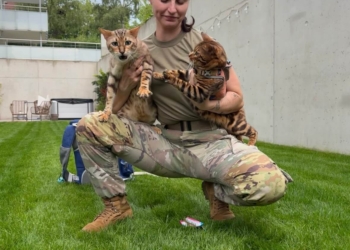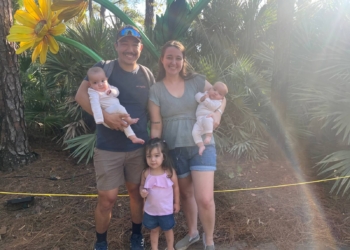When our family first lived on an airbase in Japan, it was the loneliness that caught me by surprise. Six thousand miles from home, surrounded by families in the often-literal same boat as our spouses deployed, I hadn’t anticipated how long it would take to make friends, or to find a place within groups of existing ones.
One night, as I texted with another mother, each in our respective homes eating quiet dinners with our young children, one more text arrived. ‘Want to just come over?’ she asked, and I did, dragging my toddler and baby and diaper bag a couple blocks over to hers. Eight years later, through many more moves across different countries and cities, we still pop over to share dinners – and family ski trips, brewery dates, and more, our sprawling friendship shaped from that single text.
 Simone Gorrindo’s debut memoir, “The Wives,” details the ways her life was similarly shaped by the friends she made during her husband’s first years in the Army. An editor just beginning her New York career, Gorrindo leaves it behind when Andrew chooses to enlist, a decision that shakes the foundation of their relationship. Unmoored from the professional and personal lives she’d led, the book details her adjustment to life in rural Georgia. New both to marriage and to the Army, Gorrindo’s formative years of being a spouse are intertwined with the difficult realities of being a military spouse – the deployments, the distance, the loneliness, and the extreme anxiety she experienced with a husband on the front lines of war.
Simone Gorrindo’s debut memoir, “The Wives,” details the ways her life was similarly shaped by the friends she made during her husband’s first years in the Army. An editor just beginning her New York career, Gorrindo leaves it behind when Andrew chooses to enlist, a decision that shakes the foundation of their relationship. Unmoored from the professional and personal lives she’d led, the book details her adjustment to life in rural Georgia. New both to marriage and to the Army, Gorrindo’s formative years of being a spouse are intertwined with the difficult realities of being a military spouse – the deployments, the distance, the loneliness, and the extreme anxiety she experienced with a husband on the front lines of war.
For Gorrindo, and for me, and for countless other military spouses moving through many of their days while their partner serves the country, often comes the surprising, moving realization that the people who are truly your partners during these difficult seasons of life aren’t always the people you married.
“The wives were the ones I breathed like air,” Gorrindo wrote of this time. “Andrew’s presence in my life was far more precarious.”
And often, these relationships that become ones you can’t imagine breathing without begin with gestures simple and small. My beloved friendships in Japan began with texts that became karaoke nights, lawn croquet, and Fridays on our front doorsteps, our children playing tag as fireflies lit the twilight around us. For Gorrindo, the gesture was her neighbor Rachel – a fellow Army spouse – walking across the sparse street bearing cookies and offering to help her unpack.
“It was these slow steps,” Gorrindo said. “The FRG was another, because I had never really been a joiner, and so for me to even say ‘yes’ to that was a big identity shift. It opened up all these other relationships and special avenues.”
Before her husband joined the Army, Gorrindo had scoured bookstores for models of what this life might look like, only to find that while shelves are devoted to the histories of battles and war fighters, books that explored the lives of the women were rare.
 “It felt like an unknown adventure,” she said, and she began to write essays about the many ways the other women – the wives – helped her survive. In several for “The New York Times,” she illuminated her life as a military wife, and the impact the other women made upon her. The response was enthusiastic.
“It felt like an unknown adventure,” she said, and she began to write essays about the many ways the other women – the wives – helped her survive. In several for “The New York Times,” she illuminated her life as a military wife, and the impact the other women made upon her. The response was enthusiastic.
“Readers were like ‘Oh, these are such remarkable, terrific sounding women. I want to learn more about them.’ I realized it’s really this collective experience I want to write about,” Gorrindo said.
In ways big and small, “The Wives” shares so much of what makes the world of the military spouse unique: the sacrifices of families unseen by a country where only a fraction of the population serves, and the generous ways spouses help each other through them, often filling the cavernous gaps between what the military can and cannot say, and can and cannot do.
During her first pregnancy, with her husband deployed once more to Afghanistan, Gorrindo suffered from anxiety so severe it left her unable to sleep. She often drove past her house before pulling into her driveway, fearing notification officers would be waiting at her door. A lifeline of a text arrived from her friend Rachel: ‘Come over now, in your pajamas.’ Gorrindo spent the rest of the deployment staying in Rachel’s guest room, a huge gesture of care.
Since “The Wives’” release, Gorrindo has heard from generations of military spouses who see – as I did – their stories and friendships reflected for the first time in her work. This is the book to read as you embark on life as a military spouse, and at long last, it’s a book to share with family and friends, so the world can begin to understand our lives.











































